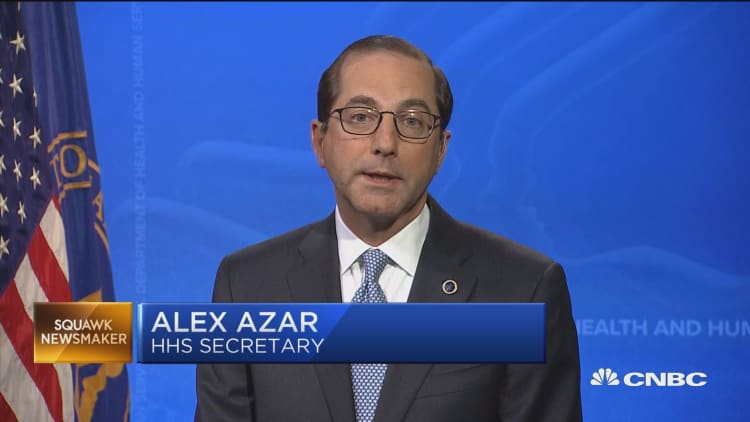
The Trump administration is making good on the president's executive order to rollback Obama-era restrictions on short-term health plans.
Insurers will be able to start selling short-term coverage that's cheaper and less comprehensive than Obamacare plans — starting in October, when open enrollment for 2019 exchange coverage is set to begin.
"We don't expect there to be significant migration away from the exchange by individuals who might otherwise purchase those policies," said Jim Parker, senior advisor on health reform to Health and Human Services Secretary Alex Azar.
"We do believe … that there'll be significant interest in these policies from individuals who today are not in the exchange and in many cases have been priced out of coverage," Parker said.
'Short-term' for up to 3 years
The administration in February proposed allowing insurers to issue short-term plans with durations of up to 12 months. Now, carriers will be able to make those plans renewable for 36 months under the final rule issued by the Department of Health and Human Services, the Treasury and Labor Departments.
Health officials say they based the new rules on regulations that allow workers to continue to pay into their employer plan coverage when they lose their jobs.
"The analogy is made to COBRA coverage, which is also temporary coverage, but can be extended out in some circumstances out to 36 months," although insurers will not be required to renew plans, said Randy Pate, senior official at the Centers for Medicare and Medicaid Services. "You could still see short-term plans on the market that are up to 12 months that are not renewable."
Exempt from Obamacare rules and protections
Short-term plans are exempt from coverage mandates under the Affordable Care Act. Not having to cover those required benefits such as free preventive care, or coverage for pregnancy and mental health, allows insurers to bring down premium costs substantially.
The plans are exempt from ACA protection limits on out-of-pocket expenses, set dollar limits for coverage, and can reject consumers due to pre-existing conditions.
"There's so little regulation of these products. It's a buyer beware situation" said Sabrina Corlette, research professor at the Center on Health Insurance Reforms at Georgetown University. "Some of them are truly junk insurance."
The administration says insurers will be required to provide clear notice to consumers that short-term plans do not offer Obamacare protections, and clearly outline what the plans cover.
"These policies are different from those offered on the exchange. We make no representation that it's equivalent coverage," Parker said.
Clearing the way for sale of the plans to begin during this year's open enrollment could make for direct competition for Obamacare plans, although health officials say some states may impose their own regulations that could delay the actual plan offerings.
Wide-ranging estimates on demand
The Obama administration had limited short-term individual plans to just three months without the option of renewal, in part to prevent the plans from siphoning off healthy people from the exchange markets.
The Trump administration maintains that 87 percent of exchange enrollees this year are receiving a tax credit, which lowers their net premiums. As result, they expect that fewer than a quarter million out of nearly 11 million exchange members will opt to switch to cheaper short-term plans.
Yet, Centers for Medicare and Medicaid actuaries estimated that with the repeal of the individual mandate penalty, 1.4 million people would sign up for coverage in longer-duration short-term plans in 2019, and roughly 600,000 would come from the pool of people who are now enrolled in exchange plans.
"We are projecting as many as 5 million short-term policies could be sold next year," said Scott Flanders, CEO of eHealth, which began selling its own co-branded short-term plans earlier this year in anticipation of the rule change.
Others are now planning to ramp up their short-term offerings for 2019. When eHealth surveyed insurers about short-term plans in July, 73 percent said they were planning to offer coverage next year — up from 42 percent when the proposed rules were announced in February.
"We think they are underestimating how much visibility will be brought to this market and players like UnitedHealth and others start innovating new product offerings, given the extended duration," Flanders said.
The administration itself is keen to promote its efforts to provide alternatives to Obamacare plans and will likely provide information about short-term plans on Healthcare.gov this fall.
"I think it's a recipe for a lot of consumers not getting good information about what is right for them and their families ... to protect them from financial harm," said Corlette.
EHealth already offers consumers calculators to help them decide which coverage will be most cost-effective. He expects insurers to offer a wider variety of short-term plans with different coverage options and price points, which will likely result in higher call volumes from people looking for help sorting through their options.
"Anyone who can qualify for a subsidy will be funneled down the path of an ACA-compliant plan — major medical is still preferred to even the most robust short-term products that we've seen so far under development," said eHealth's Flanders.
But for those who are healthy and receive too much federal assistance, he thinks longer duration short-terms plans could help fill a big need for more affordable options.


